【英语】完形填空高考真题解析
- 格式:doc
- 大小:533.00 KB
- 文档页数:55
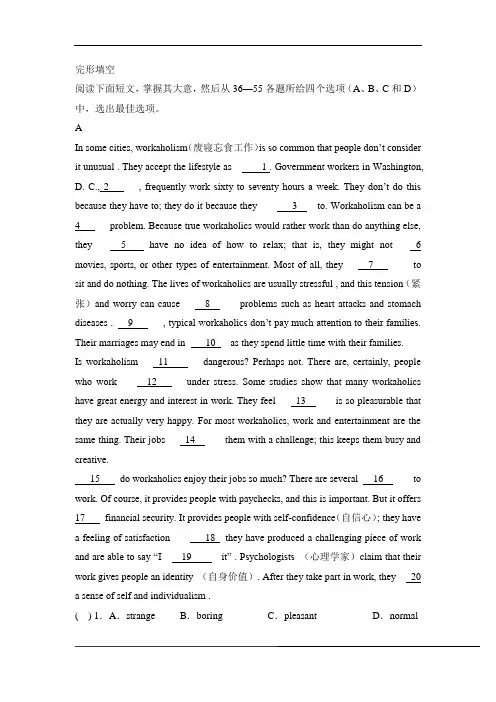
完形填空阅读下面短文,掌握其大意,然后从36—55各题所给四个选项(A、B、C和D)中,选出最佳选项。
AIn some cities, workaholism(废寝忘食工作)is so common that people don’t consider it unusual . They accept the lifestyle as 1 . Government workers in Washington, D. C., 2 , frequently work sixty to seventy hours a week. They don’t do this because they have to; they do it because they 3 to. Workaholism can be a 4 problem. Because true workaholics would rather work than do anything else, they 5 have no idea of how to relax; that is, they might not 6 movies, sports, or other types of entertainment. Most of all, they 7 to sit and do nothing. The lives of workaholics are usually stressful , and this tension(紧张)and worry can cause 8 problems such as heart attacks and stomach diseases . 9 , typical workaholics don’t pay much attention to their families. Their marriages may end in 10 as they spend little time with their families.Is workaholism 11 dangerous? Perhaps not. There are, certainly, people who work 12 under stress. Some studies show that many workaholics have great energy and interest in work. They feel 13 is so pleasurable that they are actually very happy. For most workaholics, work and entertainment are the same thing. Their jobs 14 them with a challenge; this keeps them busy and creative.15 do workaholics enjoy their jobs so much? There are several 16 to work. Of course, it provides people with paychecks, and this is important. But it offers17 financial security. It provides people with self-confidence(自信心); they havea feeling of satisfaction 18 they have produced a challenging piece of work and are able to say “I 19 it” . Psychologists (心理学家)claim that their work gives people an identity (自身价值). After they take part in work, they 20 a sense of self and individualism .( ) 1.A.strange B.boring C.pleasant D.normal( ) 2.A.for example B.on the other hand C.what’s more D.after all ( ) 3.A.agree B.promise C.dare D.want ( ) 4.A.slight B.serious C.obvious D.difficult ( ) 5.A.still B.probably C.certainly D.mostly ( ) 6.A.afford B.enjoy C.watch D.allow ( ) 7.A.dream B.decide C.intend D.hate ( ) 8.A.physical B.cultural C.social D.mental ( ) 9.A.Therefore B.However C.Anyway D.Besides ( ) 10.A.happiness B.silence C.failure D.surprise ( ) 11.A.sometimes B.always C.seldom D.hardly ( ) 12.A.sadly B.differently C.efficiently D.slowly ( ) 13.A.study B.family C.life D.work ( ) 14.A.equip B.pack C.provide D.fill ( ) 15.A.When B.Why C.How D.Where ( ) 16.A.factors B.advantages C.steps D.ways ( ) 17.A.no more B.more or less C.no more than D.more than ( ) 18.A.when B.before C.unless D.until ( ) 19.A.valued B.failed C.caught D.made ( ) 20.A.give B.lose C.get D.need答案解析1.【答案】D【解析】废寝忘食工作这种现象是如此的普遍,以至于人们认为这种工作方式是正常的。
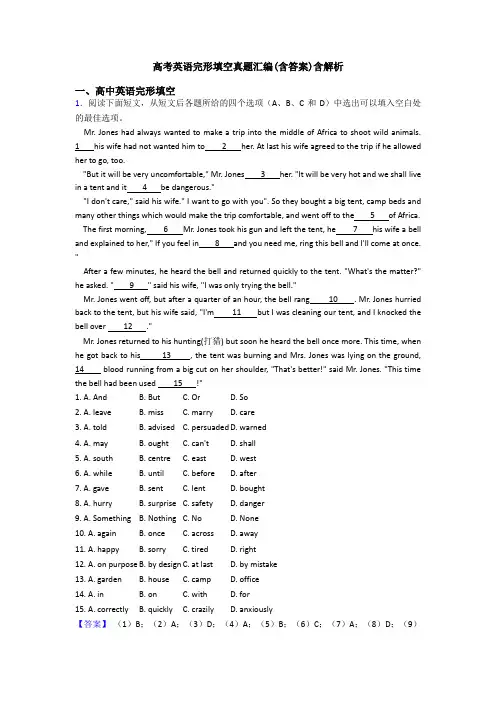
高考英语完形填空真题汇编(含答案)含解析一、高中英语完形填空1.阅读下面短文,从短文后各题所给的四个选项(A、B、C和D)中选出可以填入空白处的最佳选项。
Mr. Jones had always wanted to make a trip into the middle of Africa to shoot wild animals.1 his wife had not wanted him to2 her. At last his wife agreed to the trip if he allowed her to go, too."But it will be very uncomfortable," Mr. Jones 3 her. "It will be very hot and we shall livein a tent and it 4 be dangerous.""I don't care," said his wife." I want to go with you". So they bought a big tent, camp beds and many other things which would make the trip comfortable, and went off to the 5 of Africa.The first morning, 6 Mr. Jones took his gun and left the tent, he 7 his wife a bell and explained to her," If you feel in 8 and you need me, ring this bell and I'll come at once."After a few minutes, he heard the bell and returned quickly to the tent."What's the matter?"he asked. " 9 " said his wife, "I was only trying the bell."Mr. Jones went off, but after a quarter of an hour, the bell rang 10 . Mr. Jones hurried back to the tent, but his wife said, "I'm 11 but I was cleaning our tent, and I knocked the bell over 12 ."Mr. Jones returned to his hunting(打猎) but soon he heard the bell once more. This time, whenhe got back to his 13 , the tent was burning and Mrs. Jones was lying on the ground, 14 blood running from a big cut on her shoulder, "That's better!" said Mr. Jones. "This time the bell had been used 15 !"1. A. And B. But C. Or D. So2. A. leave B. miss C. marry D. care3. A. told B. advised C. persuaded D. warned4. A. may B. ought C. can't D. shall5. A. south B. centre C. east D. west6. A. while B. until C. before D. after7. A. gave B. sent C. lent D. bought8. A. hurry B. surprise C. safety D. danger9. A. Something B. Nothing C. No D. None10. A. again B. once C. across D. away11. A. happy B. sorry C. tired D. right12. A. on purpose B. by design C. at last D. by mistake13. A. garden B. house C. camp D. office14. A. in B. on C. with D. for15. A. correctly B. quickly C. crazily D. anxiously【答案】(1)B;(2)A;(3)D;(4)A;(5)B;(6)C;(7)A;(8)D;(9)B;(10)A;(11)B;(12)D;(13)C;(14)C;(15)A;【解析】【分析】本文是一篇记叙文,讲述了琼斯先生和妻子一起到非洲中部时打猎发生的故事。
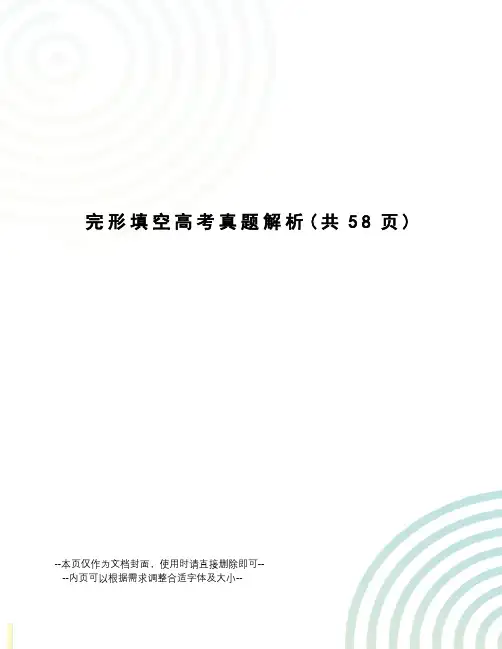
完形填空高考真题解析(共58页)--本页仅作为文档封面,使用时请直接删除即可----内页可以根据需求调整合适字体及大小--完形填空高考真题解析一、高中英语完形填空1.阅读下面短文,掌握其大意,然后从各题所给的四个选项A、B、C、D四个选项中,选出最佳选项。
I started volunteering at a soup kitchen several years ago. The original reason I was going wasto 1 community service hours for school. My plan was to 2 go there a few times and get my service hours, but it taught me a lot. The typical volunteer there served 3 to people.Basically, I was 4 serving bread and juice to whoever wanted it, which was a simple task. Some of the people were homeless, and some of them were 5 families. All of them were people in need of a hot meal and a place to 6 for an hour or several minutes.7 some of them looked like they weren't behaving well, we always took care of them.The first time I went there was right before Christmas. For the people coming to the soup kitchen, it was not exactly a 8 time. It made me think about my happy Christmas and made me feel how 9 I was. Unlike them, I have a home and I don't 10 cold or hunger. At that point, I decided that I 11 wanted to go back there. I couldn't offer them much, but I could always offer my time and 12 . The experience also gives me a feeling of 13 . Whenever I go there, people are 14 that I showed up again. They know my name and they know that I am more than happy to 15 them. It truly feels good to know that you can 16 someone's day. I've realized that the feeling of doing good for people can be a better 17 than any amount of money. You can't buy that feeling.I have never 18 a single second of my volunteering. It 19 me that dozens of cities have made it illegal to set up a soup kitchen. But I will continue my volunteer work and find more ways to show my 20 to people in need.1. A. reduce B. avoid C. complete D. cancel2. A. yet B. just C. even D. still3. A. food B. work C. time D. money4. A. tired of B. worried about C. responsible for D. free from5. A. busy B. serious C. experienced D. struggling6. A. hide B. rest C. live D. study7. A. Although B. If C. Because D. Until8. A. available B. strange C. pleasant D. painful9. A. wise B. honest C. curious D. fortunate10. A. turn down B. suffer from C. pass down D. learn from11. A. definitely B. gradually C. equally D. hardly12. A. reason B. effort C. chance D. patience13. A. stability B. guilt C. loss D. appreciation14. A. grateful B. confident C. proud D. shocked15. A. change B. leave C. forget D. help16. A. describe B. waste C. brighten D. disturb17. A. reward B. excuse C. risk D. mistake18. A. planned B. regretted C. forgiven D. understood19. A. reminds B. confuses C. encourages D. disappoints20. A. talent B. concern C. kindness D. weakness【答案】(1)C;(2)B;(3)A;(4)C;(5)D;(6)B;(7)A;(8)C;(9)D;(10)B;(11)A;(12)C;(13)D;(14)A;(15)D;(16)C;(17)A;(18)B;(19)D;(20)C;【解析】【分析】本文是一篇记叙文,作者讲述了在流动厨房当志愿者的经历,最初打算去完成规定的服务时间,最后爱上了志愿者服务,喜欢去帮助别人。
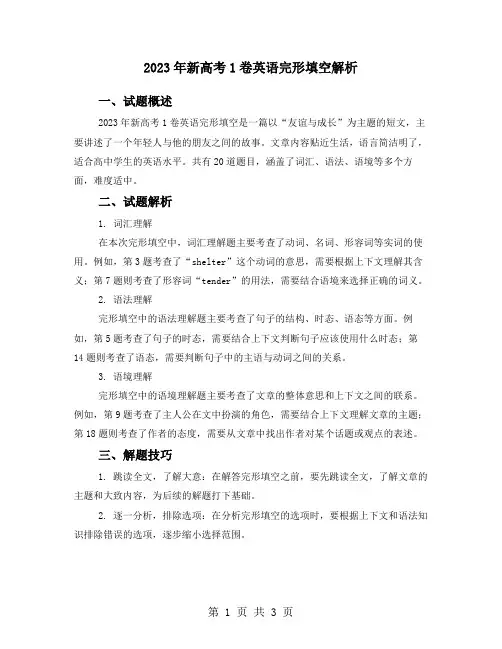
2023年新高考1卷英语完形填空解析一、试题概述2023年新高考1卷英语完形填空是一篇以“友谊与成长”为主题的短文,主要讲述了一个年轻人与他的朋友之间的故事。
文章内容贴近生活,语言简洁明了,适合高中学生的英语水平。
共有20道题目,涵盖了词汇、语法、语境等多个方面,难度适中。
二、试题解析1. 词汇理解在本次完形填空中,词汇理解题主要考查了动词、名词、形容词等实词的使用。
例如,第3题考查了“shelter”这个动词的意思,需要根据上下文理解其含义;第7题则考查了形容词“tender”的用法,需要结合语境来选择正确的词义。
2. 语法理解完形填空中的语法理解题主要考查了句子的结构、时态、语态等方面。
例如,第5题考查了句子的时态,需要结合上下文判断句子应该使用什么时态;第14题则考查了语态,需要判断句子中的主语与动词之间的关系。
3. 语境理解完形填空中的语境理解题主要考查了文章的整体意思和上下文之间的联系。
例如,第9题考查了主人公在文中扮演的角色,需要结合上下文理解文章的主题;第18题则考查了作者的态度,需要从文章中找出作者对某个话题或观点的表述。
三、解题技巧1. 跳读全文,了解大意:在解答完形填空之前,要先跳读全文,了解文章的主题和大致内容,为后续的解题打下基础。
2. 逐一分析,排除选项:在分析完形填空的选项时,要根据上下文和语法知识排除错误的选项,逐步缩小选择范围。
3. 结合语境,选择最佳答案:完形填空的答案往往不是唯一的,但每个选项在某些情况下可能是正确的。
因此,在选择答案时,要结合语境,选择最符合文章意思的答案。
4. 复读全文,验证答案:在完成所有选择题后,要复读全文,检查答案是否符合文章意思和逻辑。
如果有不妥之处,要及时更正。
四、参考答案及解析1. A:根据后文“a little while later”可知此处表示时间上的先后顺序,因此选A,“后来”。
2. C:根据下文提到的“befriended”可知此处是在描述他与小狗建立友谊的过程,因此选C,“喜欢”。
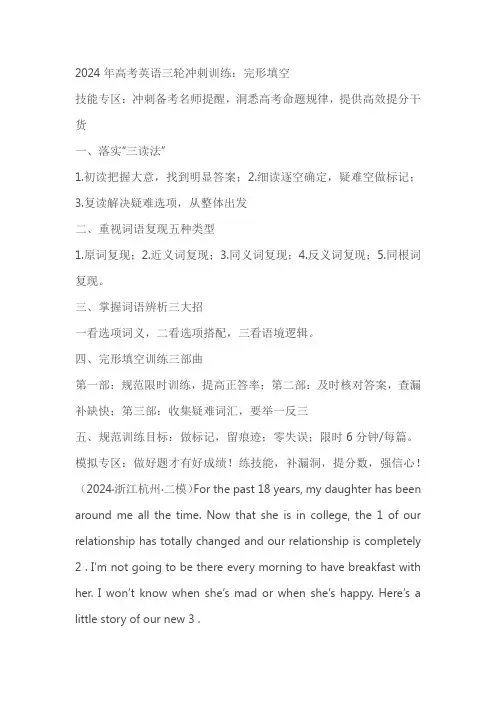
2024年高考英语三轮冲刺训练:完形填空技能专区:冲刺备考名师提醒,洞悉高考命题规律,提供高效提分干货一、落实“三读法”1.初读把握大意,找到明显答案;2.细读逐空确定,疑难空做标记;3.复读解决疑难选项,从整体出发二、重视词语复现五种类型1.原词复现;2.近义词复现;3.同义词复现;4.反义词复现;5.同根词复现。
三、掌握词语辨析三大招一看选项词义,二看选项搭配,三看语境逻辑。
四、完形填空训练三部曲第一部:规范限时训练,提高正答率;第二部:及时核对答案,查漏补缺快;第三部:收集疑难词汇,要举一反三五、规范训练目标:做标记,留痕迹;零失误;限时6分钟/每篇。
模拟专区:做好题才有好成绩!练技能,补漏洞,提分数,强信心!(2024·浙江杭州·二模)For the past 18 years, my daughter has been around me all the time. Now that she is in college, the 1 of our relationship has totally changed and our relationship is completely 2 . I’m not going to be there every morning to have breakfast with her. I won’t know when she’s mad or when she’s happy. Here’s a little story of our new 3 .A week ago, my daughter wanted to 4 so she called me during the day as I was in meetings. I 5 her later on, but she was in class. At midnight, she reached out 6 to ask if we could talk. Well, guess what I was 7 . I thought we would talk the next day, but she was not 8 .Research shows that parents are 9 when their children are grown up, but for me that is when I start to get concerned. I am always left to 10 , how can I, as a parent, remain 11 to my daughter to guide, support and love through life's changesWe may have to 12 the way we communicate. My daughter encouraged me to go digital. That’s how I ventured into the world of social media, following her updates and occasionally sharing my own experiences. Through this 13 presence, the physical gap is 14 and I feel I still have an active role in her life. This experience serves as a reminder that 15 , however scary, holds the promise of growth in our shared journey.1.A.problem B.progress C.goal D.context2.A.cold B.special C.different D.casual3.A.normal B.idea C.approach D.solution4.A.catch up B.take over C.check out D.break away 5.A.visited B.touched C.tried D.emailed6.A.by taxi B.by text C.in private D.in person7.A.stupid B.angry C.excited D.asleep 8.A.available B.interested C.ready D.guilty 9.A.saddest B.busiest C.happiest D.best 10.A.decide B.wonder C.investigate D.distinguish 11.A.kind B.appreciative C.sensitive D.relevant 12.A.voice B.ignore C.shift D.continue 13.A.human B.virtual C.physical D.permanent 14.A.widened B.formed C.broken D.bridged 15.A.college B.relationship C.change D.communication 【答案】1.D 2.C 3.A 4.A 5.C 6.B 7.D 8.A 9.C 10.B 11.D 12.C 13.B 14.D 15.C【导语】本文是一篇记叙文。
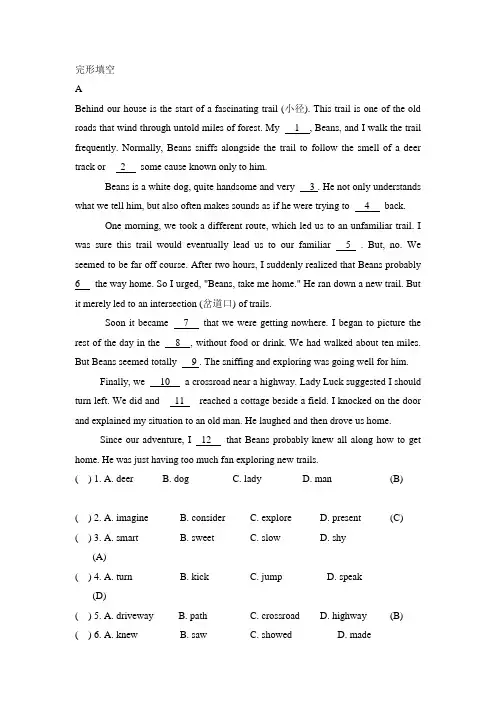
ABehind our house is the start of a fascinating trail (小径). This trail is one of the old roads that wind through untold miles of forest. My 1 , Beans, and I walk the trail frequently. Normally, Beans sniffs alongside the trail to follow the smell of a deer track or 2 some cause known only to him.Beans is a white dog, quite handsome and very 3 . He not only understands what we tell him, but also often makes sounds as if he were trying to 4 back.One morning, we took a different route, which led us to an unfamiliar trail. I was sure this trail would eventually lead us to our familiar 5 . But, no. We seemed to be far off course. After two hours, I suddenly realized that Beans probably 6 the way home. So I urged, "Beans, take me home." He ran down a new trail. But it merely led to an intersection (岔道口) of trails.Soon it became 7 that we were getting nowhere. I began to picture the rest of the day in the 8 , without food or drink. We had walked about ten miles. But Beans seemed totally 9 . The sniffing and exploring was going well for him.Finally, we 10 a crossroad near a highway. Lady Luck suggested I should turn left. We did and 11 reached a cottage beside a field. I knocked on the door and explained my situation to an old man. He laughed and then drove us home.Since our adventure, I 12 that Beans probably knew all along how to get home. He was just having too much fan exploring new trails.( ) 1. A. deer B. dog C. lady D. man (B)( ) 2. A. imagine B. consider C. explore D. present (C) ( ) 3. A. smart B. sweet C. slow D. shy(A)( ) 4. A. turn B. kick C. jump D. speak(D)( ) 5. A. driveway B. path C. crossroad D. highway (B) ( ) 6. A. knew B. saw C. showed D. made( ) 7. A, mysterious B. ridiculous C. fascinating D. apparent(D)( ) 8. A. house B. forest C. field D. cottage (B) ( ) 9. A. unconcerned B. unconscious C. undecided D. uncomfortable(A)( ) 10. A. left for B. went off C. came to D. drove toward(C)( ) 11. A. punctually B. frequently C. formally D. shortly(D)( ) 12. A. regretted B. remembered C. concluded D. confirmed(C)【语篇解读】我的狗Beans领着我沿着一条不熟悉的小路散步而迷路了,结果好不容易才回到家。
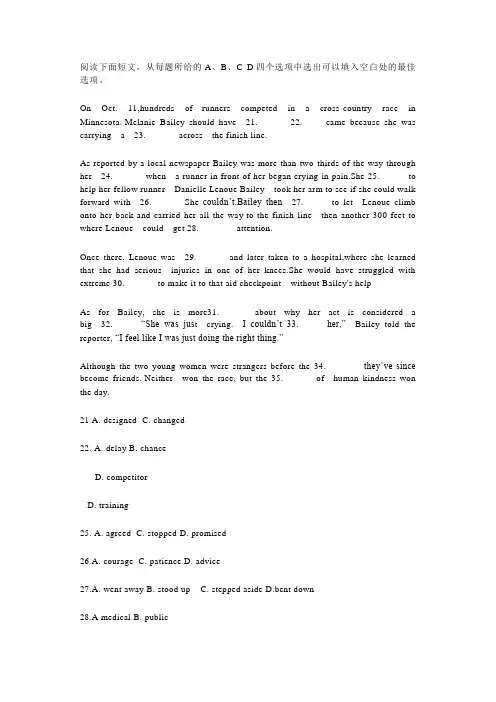
阅读下面短文,从每题所给的A、B、C D四个选项中选出可以填入空白处的最佳选项。
On Oct. 11,hundreds of runners competed in a cross-country race in Minnesota. Melanie Bailey should have21._____22._____came because she was carrying a23._______across the finish line.As reported by a local newspaper Bailey was more than two-thirds of the way through her24._______when a runner in front of her began crying in pain.She 25.______to help her fellow runner Danielle Lenoue Bailey took her arm to see if she could walk forward with26._______She couldn’t.Bailey then27.______to let Lenoue climb onto her back and carried her all the way to the finish line then another 300 feet to where Lenoue could get 28.________attention.Once there, Lenoue was29._______and later taken to a hospital,where she learned that she had serious injuries in one of her knees.She would have struggled with extreme 30._______to make it to that aid checkpoint without Bailey's helpAs for Bailey, she is more31._______ about why her act is considered a big32.______“She was jus t crying.I couldn’t 33.______her,”Bailey told the reporter, “I feel like I was just doing the right thing.”Although the two young women were strangers before the 34.________they’ve since become friends. Neither won the race, but the 35._______of human kindness won the day.21 A. designed C. changed22. A. delay B. chanceD. competitorD. training25. A. agreed C. stopped D. promised26.A. courage C. patience D. advice27.A. went away B. stood up C. stepped aside D.bent down28.A medical B. publicB. assessedC. identified31. A. worried B. ashamed C. confused D. discouraged32.A. game D. deal33.A. leave C. botherB. testC. meet答案:25C26.B 27.D 28.A 29.B32.D【词汇积累】1.a cross-country race越野比赛2.delay v./n.耽搁,延误petitor竞争者,compete v. competition n. competitive adj.4.the finish line终点5.in pain≈painfully6.fellow runner跑友,同伴7.with aid(带有)协助,帮助8.bend down 弯腰9.medical attention 医疗救助10.be assessed 被评估(assessment n.)11.struggle v./n.努力,挣扎12.extreme adj.极端的n.极端13.confused adj.困惑的14.a big deal 大事,巨额交易,要人15.kindness n.善意【完整全文及翻译】On Oct. 11,hundreds of runners competed in a cross-country race in Minnesota. Melanie Bailey should have finished delay came because she was carrying a competitor across the finish line.As reported by a local newspaper, Bailey was more than two-thirds of the way through her race, when stopped to help her fellow runner Danielle Lenoue, Bailey took her arm to see if she could walk forward with aid. She co uldn’t.Bailey then bent down to let Lenoue climb onto her back and carried her all the way to the finish line then another 300 feet to where Lenoue could get medical attention.Once there, Lenoue was assessed and later taken to a hospital,where she learned that she had serious injuries in one of her knees.She would have struggled with extreme pain to make it to that aid checkpoint without Bailey's help.As for Bailey, she is more confused about why her act is considered a big deal. “She was just cryi ng.I couldn’t leave her,”Bailey told the reporter, “I feel like I was just doing the right thing.”Although the two young women were strangers before the meet,they’ve since become friends. Neither won the race, but the display of human kindness won the day.10 月11 日,数百名跑步者在明尼苏达州参加了一场越野赛。
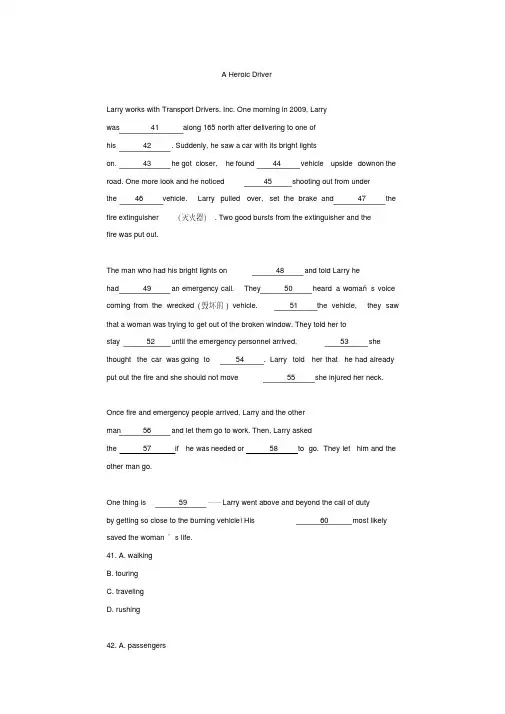
A Heroic DriverLarry works with Transport Drivers, Inc. One morning in 2009, Larrywas 41 along 165 north after delivering to one ofhis 42 . Suddenly, he saw a car with its bright lightson. 43 he got closer, he found 44 vehicle upside down o n the road. One more look and he noticed 45 shooting out from underthe 46 vehicle. Larry pulled over, set the brake and 47 the fire extinguisher(灭火器). Two good bursts from the extinguisher and thefire was put out.The man who had his bright lights on 48 and told Larry hehad 49 an emergency call. They 50 heard a woman’s voice coming from the wrecked (毁坏的) vehicle. 51 the vehicle, they saw that a woman was trying to get out of the broken window. They told her tostay 52 until the emergency personnel arrived, 53 she thought the car was going to 54 . Larry told her that he had already put out the fire and she should not move 55 she injured her neck.Once fire and emergency people arrived, Larry and the otherman 56 and let them go to work. Then, Larry askedthe 57 if he was needed or 58 to go. They let him and the other man go.One thing is 59 ——Larry went above and beyond the call of dutyby getting so close to the burning vehicle! His 60 most likely saved the woman’s life.41. A. walkingB. touringC. travelingD. rushing42. A. passengersB. colleaguesC. employersD. customers43. A. SinceB. AlthoughC. AsD. If44. A. eachB. anotherC. thatD. his45. A. flamesB. smokeC. waterD. steam46. A. usedB. disabledC. removedD. abandoned47. A. got hold ofB. preparedC. took charge ofD. controlled48. A. came downB. came throughC. came inD. came over49. A. returnedB. receivedC. madeD. confirmed50. A. thenB. againC. finallyD. even51. A. StartingB. ParkingC. PassingD. Approaching52. A. quietB. stillC. awayD. calm53. A.forB. soC. andD. but54. A. explodeB. slip awayC. fall apartD. crash55. A. as ifB. unlessC. in caseD. after56. A. stepped forwardB. backed offC. moved onD. set out57. A. womanB. policeC. manD. driver58. A. forbiddenB. readyC. askedD. free59. A. for certainB. for considerationC. reportedD. checked60. A. patienceB. skillsC. effortsD. promise【答案和解析】41. C解析:travel along 开车行进。
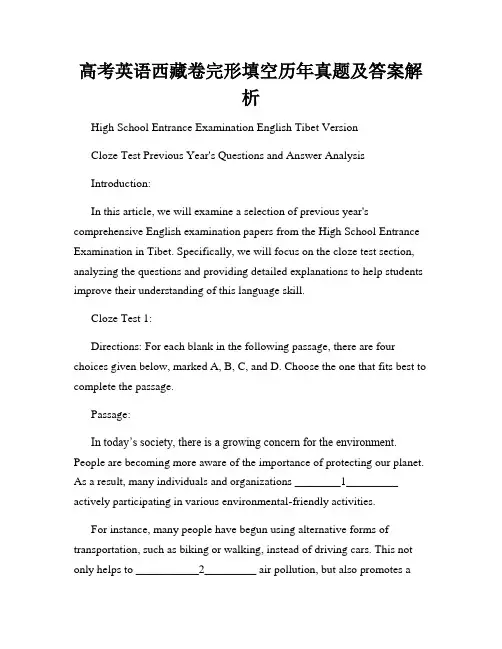
高考英语西藏卷完形填空历年真题及答案解析High School Entrance Examination English Tibet VersionCloze Test Previous Year's Questions and Answer AnalysisIntroduction:In this article, we will examine a selection of previous year's comprehensive English examination papers from the High School Entrance Examination in Tibet. Specifically, we will focus on the cloze test section, analyzing the questions and providing detailed explanations to help students improve their understanding of this language skill.Cloze Test 1:Directions: For each blank in the following passage, there are four choices given below, marked A, B, C, and D. Choose the one that fits best to complete the passage.Passage:In today’s society, there is a growing concern for the environment. People are becoming more aware of the importance of protecting our planet. As a result, many individuals and organizations ________1_________ actively participating in various environmental-friendly activities.For instance, many people have begun using alternative forms of transportation, such as biking or walking, instead of driving cars. This not only helps to ___________2_________ air pollution, but also promotes ahealthier lifestyle. In addition, many households have started___________3_________ their energy consumption by using energy-efficient appliances and turning off lights when not in use.Furthermore, more people are ___________4_________ in recycling programs. The recycling of paper, plastic, and glass products has become increasingly popular. Campaigns are also conducted to raise awareness about the importance of recycling and its positive impact on the environment. By actively participating in these programs, individuals contribute to reducing waste and saving valuable resources.Answer Analysis:1. B) are: This option is the correct choice as it corresponds to the present continuous tense, indicating an ongoing action of individuals and organizations participating in environmental-friendly activities.2. A) reduce: This option best fits the context as it indicates the action of decreasing air pollution, aligning with the idea of alternative forms of transportation.3. D) conserving: This word choice accurately reflects the action of saving or preserving energy, highlighting the use of energy-efficient appliances and turning off lights.4. C) involved: This option correctly depicts individuals' active engagement in recycling programs.Cloze Test 2:Directions: For each blank in the following passage, there are four choices given below, marked A, B, C, and D. Choose the one that fits best to complete the passage.Passage:The advent of smartphones has revolutionized the way we communicate and access information. However, its excessive use can also lead to a variety of negative consequences. For example, individuals who___________5_________ excessively on their smartphones often experience a decrease in productivity.In addition, prolonged ___________6_________ to the blue light emitted by smartphones can disrupt sleep patterns and affect overall health. Moreover, excessive use of smartphones can hinder face-to-face interactions, leading to social isolation.To address these issues, individuals can ___________7_________ practices to limit their smartphone usage. One effective strategy is to set designated periods of time for smartphone use, allowing for breaks during work or study. Additionally, engaging in offline activities such as exercising, reading, or spending time with friends can help reduce dependency on smartphones.Answer Analysis:5. C) rely: This option fits the context as relying on smartphones excessively is the cause of experiencing a decrease in productivity.6. B) exposure: This word aligns with the idea of being exposed to the blue light emitted by smartphones, resulting in sleep disturbance and health issues.7. D) adopt: This option accurately represents the action of embracing or acquiring practices to limit smartphone usage.Conclusion:Through analyzing these cloze test questions and their answer explanations, students can gain valuable insights into the language patterns and strategies required to excel in this section of the High School Entrance Examination. By honing their comprehension and vocabulary skills, students can efficiently approach future examinations, maximizing their chances of success.Remember, practice makes perfect, and regular exposure to previous year's examination questions helps students become familiar with the format and develop effective test-taking strategies. Good luck with your English studies and preparations for the upcoming High School Entrance Examination!。
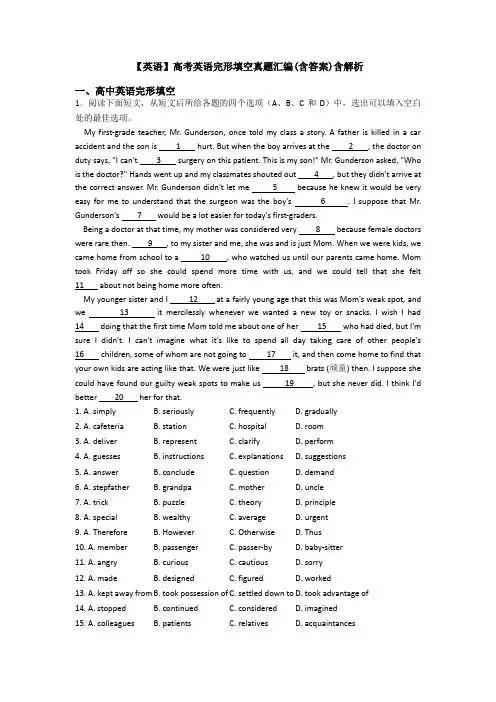
【英语】高考英语完形填空真题汇编(含答案)含解析一、高中英语完形填空1.阅读下面短文,从短文后所给各题的四个选项(A、B、C和D)中,选出可以填入空白处的最佳选项。
My first-grade teacher, Mr. Gunderson, once told my class a story. A father is killed in a car accident and the son is 1 hurt. But when the boy arrives at the 2 , the doctor on duty says, "I can't 3 surgery on this patient. This is my son!" Mr. Gunderson asked, "Whois the doctor?" Hands went up and my classmates shouted out 4 , but they didn't arrive at the correct answer. Mr. Gunderson didn't let me 5 because he knew it would be very easy for me to understand that the surgeon was the boy's 6 . I suppose that Mr. Gunderson's 7 would be a lot easier for today's first-graders.Being a doctor at that time, my mother was considered very 8 because female doctors were rare then. 9 , to my sister and me, she was and is just Mom. When we were kids, we came home from school to a 10 , who watched us until our parents came home. Mom took Friday off so she could spend more time with us, and we could tell that she felt 11 about not being home more often.My younger sister and I 12 at a fairly young age that this was Mom's weak spot, andwe 13 it mercilessly whenever we wanted a new toy or snacks. I wish I had 14 doing that the first time Mom told me about one of her 15 who had died, but I'm sure I didn't. I can't imagine what it's like to spend all day taking care of other people's 16 children, some of whom are not going to 17 it, and then come home to find that your own kids are acting like that. We were just like 18 brats (顽童) then. I suppose she could have found our guilty weak spots to make us 19 , but she never did. I think I'd better 20 her for that.1. A. simply B. seriously C. frequently D. gradually2. A. cafeteria B. station C. hospital D. room3. A. deliver B. represent C. clarify D. perform4. A. guesses B. instructions C. explanations D. suggestions5. A. answer B. conclude C. question D. demand6. A. stepfather B. grandpa C. mother D. uncle7. A. trick B. puzzle C. theory D. principle8. A. special B. wealthy C. average D. urgent9. A. Therefore B. However C. Otherwise D. Thus10. A. member B. passenger C. passer-by D. baby-sitter11. A. angry B. curious C. cautious D. sorry12. A. made B. designed C. figured D. worked13. A. kept away from B. took possession of C. settled down to D. took advantage of14. A. stopped B. continued C. considered D. imagined15. A. colleagues B. patients C. relatives D. acquaintances16. A. sick B. educated C. naughty D. respectful17. A. mention B. favor C. make D. require18. A. honored B. distinguished C. spoiled D. defeated19. A. support B. obey C. consult D. respond20. A. judge B. hate C. envy D. thank【答案】(1)B;(2)C;(3)D;(4)A;(5)A;(6)C;(7)B;(8)A;(9)B;(10)D;(11)D;(12)C;(13)D;(14)A;(15)B;(16)A;(17)C;(18)C;(19)B;(20)D;【解析】【分析】本文是一篇记叙文,作者的妈妈是当时为数不多的女医生,但是由于工作时间长,很少有时间去陪伴自己的孩子,孩子们利用妈妈的这个弱点,向妈妈要各种玩具或小吃,并且妈妈也没有揭穿他们,作者对妈妈的这个做法表示感谢,对自己的做法感到羞愧。
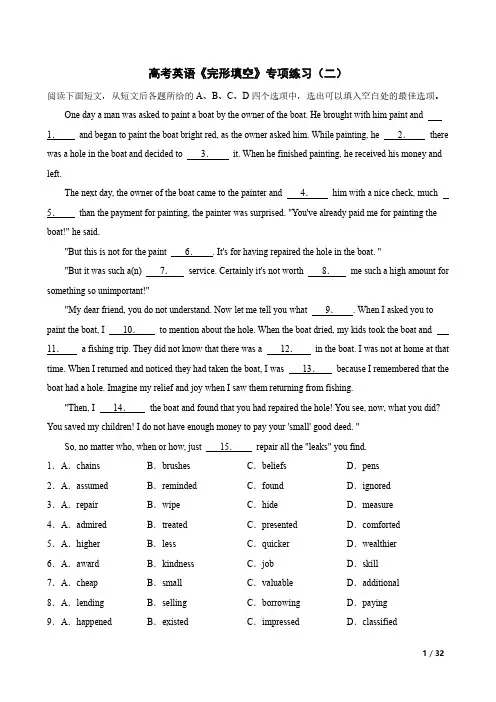
高考英语《完形填空》专项练习(二)阅读下面短文,从短文后各题所给的A、B、C、D四个选项中,选出可以填入空白处的最佳选项。
One day a man was asked to paint a boat by the owner of the boat.He brought with him paint and 1.and began to paint the boat bright red,as the owner asked him.While painting,he2.there was a hole in the boat and decided to3.it.When he finished painting,he received his money and left.The next day,the owner of the boat came to the painter and4.him with a nice check,much 5.than the payment for painting,the painter was surprised."You've already paid me for painting the boat!"he said."But this is not for the paint6..It's for having repaired the hole in the boat.""But it was such a(n)7.service.Certainly it's not worth8.me such a high amount for something so unimportant!""My dear friend,you do not understand.Now let me tell you what9..When I asked you to paint the boat,I10.to mention about the hole.When the boat dried,my kids took the boat and 11.a fishing trip.They did not know that there was a12.in the boat.I was not at home at that time.When I returned and noticed they had taken the boat,I was13.because I remembered that the boat had a hole.Imagine my relief and joy when I saw them returning from fishing."Then,I14.the boat and found that you had repaired the hole!You see,now,what you did? You saved my children!I do not have enough money to pay your'small'good deed."So,no matter who,when or how,just15.repair all the"leaks"you find. 1.A.chains B.brushes C.beliefs D.pens 2.A.assumed B.reminded C.found D.ignored 3.A.repair B.wipe C.hide D.measure 4.A.admired B.treated C.presented D.comforted 5.A.higher B.less C.quicker D.wealthier 6.A.award B.kindness C.job D.skill 7.A.cheap B.small C.valuable D.additional 8.A.lending B.selling C.borrowing D.paying 9.A.happened B.existed C.impressed D.classified10.A.decided B.hated C.forgot D.remembered 11.A.went through B.went on C.dreamed about D.reflected on 12.A.hole B.sign C.rule D.danger 13.A.angry B.desperate C.embarrassed D.sufficient 14.A.pulled B.spotted C.examined D.destroyed 15.A.possibly B.carefully C.actually D.finally阅读下面短文,从每题所给的A、B、C、D四个选项中选出可以填入空白处的最佳选项。
2023高考英语新高考II卷完形填空全考点解析附译文[名校内部资料]第一节(共15小题;每小题1分,满分15分)阅读下面短文,从每题所给的A、B、C、D四个选项中选出可以填入空白处的最佳选项。
In April last year, I saw a post on the PNP (Pilots N Paws) website from a family in Topeka. They had to move to Virginia but they were on a very tight 41 . They could not afford to pay for 42 for their dog, Tiffy, and 43 wanted to take her with them.It just 44 that I was planning another PNP flight with another pilot, Karen, who 45 to take Tiffy from Kansas City to Virginia. What I was to do was fly to Topeka to 46 Tiffy.When I met Tiffy’s owners, they seemed very 47 . George, the husband, was trying to be calm, but I could tell this was 48 for him, having to leave his dog to a 49 and trust that everything would 50 .After some goodbyes, I asked George and his wife to help me 51 Tiffy into the plane. I promised to take care of Tiffyand 52 them as soon as we got to Kansas City.The flight was 53 , and Tiffy was a great passenger. The next day, she 54 with Karen and made it back to George in Virginia within a few days. He was so 55 and sent me a nice e-mail with pictures. It felt great to know that I had helped bring this family together again.41. A. turn B. budgetC. scheduleD. connection42. A. food B. shelterC. medicineD. transportation43. A. desperately B. temporarilyC. secretlyD. originally44. A. appeared B. provedC. happenedD. showed45. A. waited B. offeredC. hurriedD. failed46. A. see off B. look forC. hand overD. pick up47. A. confused B. nervousC. annoyedD. curious48. A. hard B. fineC. commonD. lucky49. A. coworker B. passengerC. strangerD. neighbor50. A. speed up B. work outC. come backD. take off51. A. feed B. followC. changeD. load52. A. call B. joinC. leaveD. serve53. A. unnecessary B. unexpectedC. unavoidableD. uneventful54. A. returned B. foughtC. flewD. agreed55. A. thankful B. generousC. proudD. sympathetic参考答案:41-45 BDACB 46-50 DBACB 51-55 DADCA文章主旨:本文是一篇记叙文,讲述了作者和另外一位飞行员通过PNP计划帮助一家人把宠物狗从托皮卡运送到弗吉尼亚的故事。
文体分类练(三)——夹叙夹议文Test1(2021·湖北黄冈高三4月调研)A lonely girl found two starving birds in the woods. She took them home and put them in a 1 cage. She cared for them with love and the birds grew strong. One day the girl 2 the door to the cage open. One bird flew from the small cage. The girl was so 3 that it would fly away. As it flew close, she grasped it 4. She was glad at her success in 5 it. Suddenly she felt the bird breathless. It was her desperate love that had killed the bird.She 6 the other bird moving back and forth on the 7 of the cage. She could feel its great 8 for freedom. It needed to fly into the blue sky. She lifted it from the cage and tossed(抛) it 9 into the air. The bird circled once, twice, and three times.The girl looked happily at the bird’s 10. She was no longer concerned with her 11, because she did want the bird to be 12. Suddenly the bird flew closer and 13 softly on her shoulder. It sang the sweetest song that she had ever heard.The fastest way to lose love is to14 it too tight, while the best way to keep love is to give it 15.1.A.dark B.woodenC.plasticD.small2.A.left B.remainedC.imaginedD.remembered3.A.excited B.frightenedC.annoyedD.pleased4.A.unexpectedly B.quicklyC.wildlyD.immediately5.A.holding B.reachingC.catchingD.following6.A.heard B.realisedC.recognisedD.noticed7.A.edge B.topC.baseD.surface8.A.idea B.wishC.shareD.destination9.A.softly B.quietlyC.heavilyD.suddenly10.A.entertainment B.enjoymentC.exerciseD.singing11.A.opinion B.reliefC.painD.loss12.A.trapped B.strongC.happyD.alonended B.fellC.droppedD.sat14.A.hold up B.hold on toC.take upD.take in15.A.soul B.lifeC.wingsD.legsTest2Before my year abroad, everyone advised me to say “yes” to everything. They weren’t 1. However, here in Germany,“I don’t mind.” doesn’t seem to be an acceptable 2. Neither does “I’ll do whatever you want to do.” or “Really, either way is fine by me.” It really is just yes or no.Despite having a huge smile on your face, most 3 will look at you as if you’re incapable of 4 a decision which of course isn’t true and we’re just being really typically British. My first encounter of this was when I 5my hotel for the first two nights in Germany. The owner asked when I would like my breakfast in the morning. Being typically British, I replied that any time was 6 for her. She gave me a confused look and asked again.“No, when do you want to have 7?”“Er, OK ... err ... 8 a.m.?” she smiled and I 8 quickly,“Only if that is 9 for you though.”I knew about the British stereotype(模式化观念) of 10 before I came abroad. However, I didn’t 11 until I arrived here and began experiencing it on a day-to-day basis. Waiters give you funny looks in restaurants when you say “thank you” repeatedly when they 12 all kinds of services. But that’s just right for the British and for everyone else, being so polite is totally 13.And when it comes to me asking questions, it’s even worse.“Would you be able to do that for me if it’s not too much trouble, please?” just doesn’t work here. You have to be 14 and say what you want. The first time I said “Pass that here”, my heart was 15 and I could almost hear my mum screaming in my head about manners.1.A.wrong B.specialC.cleverD.kind2.A.excuse B.sentenceC.rewardD.answer3.A.Germans B.ChineseC.BritishD.Americans4.A.explaining B.makingC.understandingD.correcting5.A.chose B.orderedC.leftD.reached6.A.cheapest B.longestC.properestD.hardest7.A.lunch B.supperC.breakfastD.dinner8.A.stated B.agreedC.apologisedD.added9.A.appropriate B.ridiculousC.convenientD.abstract10.A.business B.politenessC.weaknessD.happiness11.A.realise B.believeC.expectD.forget12.A.accept B.offerC.sellD.introduce13.A.unfortunate B.unsatisfyingC.unnecessaryD.uninteresting14.A.clever B.directC.creativeD.honest15.A.beating B.movingC.jumpingD.racingTest3One day when I was making food in the kitchen, my brother came in. He placed his beef next to my 1 one,“Courtney, your beef is bigger than mine. You don’t need to 2; you’re already fat enough.”Unpleasant3 on my physical appearance were nothing new. Something inside me accepted his idea that my legs were 4. For the next 15 years, I spent summer after summer 5 in long pants.Then I met Ragen Chastain, who 6 everything. I couldn’t believe that this woman weighing almost 300 pounds was so 7 and happy. She talked about how amazing our 8 were, simply because of what they did every day—like breathing, 9blood to every cell and walking.I suddenly realised how foolish I’d been for so long. Some people were born 10 legs or lose their legs, and I’d been hiding my healthy and beautiful legs 11 because they weren’t good enough! The next day, I bought three pairs of shorts and a sundress and spent the entire summer letting my legs 12 the sun and feel the breeze.The next time anyone comments on your body in a13 way, look at them straight on and say,“If that 14 you so much, please look 15 else.”1.A.small B.plainC.thickD.slim2.A.walk B.eatC.talkD.cry3.A.reports B.suggestionsC.reflectionsments4.A.unnecessary B.unacceptableC.uniqueD.unimportant5.A.sleeping B.roastingC.drivingD.running6.A.changed B.solvedC.believedD.explained7.A.sensitive B.generousC.tiresomeD.energetic8.A.legs B.weightsC.bodiesD.images9.A.pulling B.puttingC.preventingD.pumping10.A.with B.beyondC.withoutD.except11.A.in shame B.in panicC.in prideD.in delight12.A.avoid B.seeC.coverD.kick13.A.normal B.specialC.differentD.negative14.A.amuses B.excitesC.bothersD.hurts15.A.somewhere B.anywhereC.nowhereD.everywhere文体分类练(三)——夹叙夹议文Test1【语篇导读】本文是一篇夹叙夹议文。
高考英语复合句与并列句完形填空题30题答案解析版1There is a beautiful park in our city. The park which is full of colorful flowers and tall trees is a popular place for people to relax. In the park, there is a small lake around which many people like to walk. The benches on which people can sit are placed under the shade of the trees. The children who are playing happily in the park add vitality to the place.1. The park ____ is full of colorful flowers and tall trees is a popular place for people to relax.A. whoB. whichC. whereD. when答案:B。
先行词是park,在定语从句中作主语,所以用which。
A 选项who 用于先行词是人时;C 选项where 用于先行词是地点且在从句中作状语;D 选项when 用于先行词是时间且在从句中作状语。
2. There is a small lake around ____ many people like to walk.A. whichB. thatC. whoD. whom答案:A。
先行词是lake,“around+关系代词”引导定语从句,介词后只能用which 和whom,先行词是物,所以用which。
B 选项that 不能用在“介词+关系代词”的结构中;C 选项who 用于先行词是人时;D 选项whom 用于先行词是人且在从句中作宾语。
2023年高考英语真题完形填空题·完全解析(广东、河南、江苏、广西卷)2023年高考英语真题完形填空题·完全解析(广东、河南、江苏、广西卷)What is intelligence(智力) anyway? When I was inthe army I ___1___ an intelligence test that allsoldiers took, and, against ___2___ of 100, scored 160.I had an auto-repair man once, who, on theseintelligence tests, could not ___3___ have scored morethan 80. ___4___, when anything went wrong with my carI hurried to him -- and he always ___5___ it.Well, then, suppose my auto-repair man ___6___questions for some intelligence tests. By every one ofthem I'd prove myself a ___7___. In a world where Ihave to work with my ___8___, I'd do poorly.Consider my auto-repair man___9___. He had a habitof telling ___10___. One time he said, "DoC. a deaf-and-dumb (聋哑) man ___11___ some nails. Havingentered a store, he put two fingers together on thecounter and made ___12___ movements with the other hand. The clerk brought him a hammer. He ___13___ his head and pointed to the two fingers he was hammering. The clerk ___14___ him some nails. He picked out the right size and left. Well, DoC. the___15___man who came in was blind. He wanted scissors (剪刀). ___16___ do you suppose he asked for them?" I lifted my right hand and made scissoring movements with my first two fingers. He burst out laughing and said, "Why, you fool, he used his ___17___ and asked for them. I've been ___18___ that on all my customers today, but I knew ___19___ I'd catch you." "Why is that?" I asked. "Because you are so goddamned educated, Dr. I knew you couldn't be very___20___.And I have an uneasy feeling he had something there.1. A. failed B. wrote C. receivedD. chose2. A. an average B. a total C. an examD. a number3. A. always B. possibly C. certainlyD. frequently4. A. Then B. Thus C. Therefore D. Yet5. A. fixed B. checked C. droveD. changed6. A. answered B. practised C. designedD. tried7. A. teacher B. doctor C. winner D. fool8. A. brains B. effort C. handsD. attention9. A. again B. as usual C. tooD. as well10. A. lies B. jokes C. newsD. tales11. A. bought B. tested C. found D. needed12. A. cutting B. hammering C. waving D. circling13. A. nodded B. raised C. shookD. turned14. A. brought B. packed C. sent D. sold15. A. clever B. other C. rightD. next16. A. What B. How C. Who D. Which17. A. imagination B. hand C. voiceD. information18. A. trying B. proving C. practisingD. examining19. A. for sure B. at once C. in factD. right now20. A. clear B. silly C. slowD. smart1-5 CABDA 6-10 CDCAB 11-15 DBCAD 16-20 BCAAD该题选取了一篇夹叙夹议的短文,通过事实说明不同的人在不同的方面会表现出不同的智力程度,富含哲理,具有较强的教育意义。
专题14完形填空记叙文年份卷别动词(短语)三年(41考)形容词(短语)三年(20考)名词(短语)三年(30考)介词(短语)三年(4考)副词(短语)三年(5考)2024全国甲卷73822023全国甲卷8741全国乙卷123322022全国甲卷83711浙江卷1月6482命题趋势1.分析近三年高考真题可知,记叙文完形填空题材贴近考生生活,遵循“稳中求变、局部创新”。
话题保持意义积极向上的内容,传播正能量。
2.记叙文类完形填空主要有两条线索贯穿全文:情节线即故事发展的脉络和情节。
情感线即情感变化的过程和原因。
3.主要考查实词:动词、动词短语、名词、形容词和副词,对虚词的考查如介词和连词呈下降趋势。
重点考查词义辨析及在具体语境中表达的准确性和得体性。
精准练01全国卷1.(2024年全国甲卷)One day,we had a family dinner.While the adults were busy with their serious talk outside,I was left alone in the ____21____to help my grandmother wash dishes.____22____my grandmother would tell me stories about her childhood.Born just before WWII,my grandmother ____23____an entirely different childhood lifestyle from mine.She did not have a chance to go to ____24____.Like in typical families,where boys were ____25____much more than girls,my grandma had to stay at home to do ____26____.The only opportunity (机会)she could seize to ____27____was when her brother was having Chinese ____28____with the family tutor.She would sit quietly atthe far end of the long dinner table,listening____29____.This training taught her to read and write her Chinese upside down—a skill that has turned out to be quite____30____,especially whenever we share the newspaper. On most weekends,my grandmother,a young girl then,and her brother would go to the____31____.There,they would walk through deep water,sit down cross-legged underwater and hold their____32____while they watched all action going on around them.This is something I____33____—her ability to open her____34____ underwater and still sit comfortably on the seabed.My childhood is quite____35____compared with hers.I am____36____that I did not need to____37____ the hardships like she did.I've never faced the problem of____38____.I guess our different childhood background is what makes my grandmother such an amazing person to____39____to:her stories always make my history textbooks____40____.21.A.sitting room B.kitchen C.yard D.dining hall22.A.As always B.By the way C.For example D.Here and now23.A.adjusted B.promoted C.achieved D.experienced24.A.work B.school C.court D.press25.A.favored B.tolerated C.trusted D.acknowledged26.A.gardening B.homework C.business D.housework27.A.exercise B.study C.explore D.teach28.A.food B.guests C.lessons D.tea29.A.closely B.directly C.nervously D.freely30.A.professional B.awkward C.simple D.practical31.A.market B.mountain C.beach D.class32.A.secret B.breath C.view D.tongue33.A.admire B.notice C.adopt D.value34.A.hands B.mouth C.eyes D.arms35.A.difficult plex C.happy D.similar36.A.grateful B.surprised C.convinced D.regretful37.A.reflect upon B.go through C.ask about D.prepare for38.A.unemployment B.health cation munication39.A.attend B.refer C.lead D.talke true e round e out e alive【答案】21.B22.A23.D24.B25.A26.D27.B28.C29.A30.D31. C32.B33.A34.C35.C36.A37.B38.C39.D40.D【解析】【导语】本文是一篇夹叙夹议文。
完形填空阅读下面短文,从短文后各题所给的四个选项(A、B、C和D)中,选出可以填入的空白处的最佳选项。
AIt was a busy morning, about 8:30, when an elderly gentleman in his 80s came to the hospital. I heard him saying to the nurse that he was in a hurry for appointment (约会)at 9:30.The nurse had him take a 1 in the waiting area, 2 him it would be at least 40 minutes 3 someone would be able to see him .I saw him 4 his watch and decided, since I was 5 buy-my patient didn’t 6 at the appointed hour ,I would examine his wound, While taking care of his wound ,I asked him if he had another doctor’s appointment.The gentleman said no and told me that he 7 to go to the nursing home on eat breakfast with his 8 .He told me that she had been 9 for a while and that she had a special disease, I asked if she would be 10 if he was a bit late. He replied that she 11 knew who he was ,that she had not been able to 12 him for five years now. I was 13 and asked him,” And you 14 go every morning, even though she does n’t know who you are?”He smiled and said .”She doesn’t know me, but I know who she is” I had to hold back 15 as he left.Now I 16 that in marriages, true love is 17 of all that, The happiest people don’t 18 have the best of everything; they just 19 the best of everything they have.20 isn’t about how to live through the storm, but how to dance in the rain.( ) 1.A.breath B. test C. seat D. break( ) 2.A.persuading B. promising C. understanding D. telling( ) 3. A. if B. before C. since D. after( ) 4. A. taking off B. fixing C. looking at D. winding( ) 5. A. very B. also C. seldom D. not( ) 6. A. turn up B. show off C. come on D. go away( ) 7. A. needed B. forgot C . agreed D. happened( ) 8. A. daughter B. wife C. mother D. sister( ) 9. A late B. well C. around D. there( ) 10. A. lonely B. worried C. doubtful D. hungry( ) 11. A. so far B. neither C. no longer D. already( ) 12. A. recognize B. answer C. believe D. expect( ) 13.A. moved B. disappointed C. surprised D .satisfied ( ) 14.A. only B. then C. thus D. still( ) 15.A. curiosity B. tears C. words D. judgment ( ) 16. A. realize B. suggest C. hope D. prove ( ) 17. A. agreement B. expression C. acceptance D. exhibition ( ) 18. A. necessarily B. completely C. naturally D. frequently ( ) 19. A. learn B. make C. favor D. try( ) 20. A. Adventure B. Beauty C. Trust D .Life完形填空1—5 CDBCD6—10 AABDB11—15 CACDB16—20 ACABD1. C seat解析:关键名词就在后面waiting room。
【英语】完形填空高考真题解析一、高中英语完形填空1.阅读下面短文,从每题所给的A、B、C、D四个选项中,选出最佳选项。
Another person's enthusiasm was what set me moving toward the success I have achieved. That person was my stepmother.I was nine years old when she entered our home in rural Virginia. My father 1 me to her with these words: "I would like you to meet the fellow who is 2 for being the worst boy in this county and will probably start throwing rocks at you no 3 than tomorrow morning."My stepmother walked over to me, 4 my head slightly upward, and looked me right in the eye. Then she looked at my father and replied, "You are 5 .This is not the worst boy at all, 6 the smartest one who hasn't yet found an outlet(释放的途径)for his enthusiasm."That statement began a(n) 7 between us. No one had ever called me smart, My family and neighbors had built me up in my 8 as a bad boy. My stepmother changed all that.She changed many things. She 9 my father to go to a dental school, from which he graduated with honors. She moved our family into the county seat, where my father's career could be more 10 and my brother and I could be better 11 .When I turned fourteen, she bought me a secondhand 12 and told me that she believed that I could become a writer. I knew her enthusiasm, I 13 it, and I saw how it had already improved our lives. I accepted her 14 and began to write for local newspapers. I was doing the same kind of 15 that great day I went to interview Andrew Carnegie and received the task which became my life's work later. I wasn't the 16 beneficiary (受益者).My father became the 17 man in town. My brother and stepbrothers became a physician, a dentist, a lawyer, and a college president.What power 18 has! When that power is released to support the certainty of one's purpose and is 19 strengthened by faith, it becomes an irresistible(不可抗拒的)force which poverty and temporary defeat can never 20 .You can communicate that power to anyone who needs it. This is probably the greatest work you can do with your enthusiasm.1. A. rushed B. introduced C. carried D. sent2. A. distinguished B. favored C. mistaken D. rewarded3. A. sooner B. earlier C. longer D. later4. A. dragged B. shook C. raised D. bent5. A. perfect B. right C. wrong D. impolite6. A. but B. so C. and D. or7. A. agreement B. friendship C. gap D. relationship8. A. opinion B. image C. expectation D. mind9. A. begged B. persuaded C. ordered D. invited10. A. successful B. meaningful C. helpful D. useful11. A. treated B. entertained C. educated D. respected12. A. camera B. radio C. bicycle D. typewriter13. A. considered B. suspected C. ignored D. appreciated14. A. belief B. request C. criticism D. description15. A. teaching B. studying C. writing D. reading16. A. next B. same C. only D. real17. A. cleverest B. strongest C. wealthiest D. healthiest18. A. enthusiasm B. sympathy C. fortune D. confidence19. A. deliberately B. happily C. traditionally D. constantly20. A. match B. win C. reach D. doubt【答案】(1)B;(2)A;(3)D;(4)C;(5)C;(6)A;(7)B;(8)D;(9)B;(10)A;(11)C;(12)D;(13)D;(14)A;(15)B;(16)C;(17)C;(18)A;(19)D;(20)A;【解析】【分析】本文是一篇记叙文,一个继母对作者的肯定,从而激发了孩子心中的对成功的渴望,继母心中的热情,终于促使作者成功了。
(1)考查动词。
A. rushed“冲”;B. introduced“介绍”;C. carried“运送”;D. sent“送,派遣”。
根据下文“I would like you to meet the fellow,”可知这里指爸爸把我介绍给了继母。
故选B。
(2)考查形容词。
A. distinguished“著名的”;B. favored“支持的,有利的”;C. mistaken“错误的”;D. rewarded“受到奖励的”。
根据上文的“for being the worst boy”可知,作者因为是最坏的孩子而著名。
故选A。
(3)考查副词。
A. sooner“很快”;B. earlier“更早”;C. longer“更长”;D. l ater“后来,迟于”。
这里指作者不迟于明天早上就会向继母扔石头。
no later than“不迟于”,故选D。
(4)考查动词。
A. dragged“拖拉”;B. shook“震动,摇晃”;C. raised“举起,提高,筹集,饲养”;D. bent“弯腰”。
根据后面的单词upward,可知继母轻轻的抬起我的头。
故选C。
(5)考查形容词。
A. perfect“完美的”;B. right“正确的”;C. wrong“错误的”;D. impolite“不礼貌的”。
根据下文的“This is not the worst boy at all, ”可知是反驳爸爸的话,你错了。
故选C。
(6)考查连词。
A. but“但是”;B. so“因此”;C. and“并且”;D. or“或者”。
这句话使用的是not…but…结构,这不是最坏的男孩而是最好的男孩还没有找到热情的出口。
故选A。
(7)考查名词。
A. agreement“同意”;B. friendship“友谊”;C. gap“缺口,分歧,间隔”;D. relationship“关系”。
这句话开始了我们之间的友谊,用友谊说明关系的亲密。
故选B。
(8)考查名词。
A. opinion“观点”;B. image“形象”;C. expectation“期望”;D. mind“思维”。
我的家庭和邻居让我在内心认定自己一直是一个坏男孩。
故选D。
(9)考查动词。
A. begged“乞求”;B. persuaded“说服”;C. ordered“命令”;D. invited“邀请”。
继母说服了我父亲去上一个牙科学校。
故选B。
(10)考查形容词。
A. successful“成功的”;B. meaningful“有意义的”;C. helpful“有帮助的”;D. u seful“有用的”。
修饰career用successful,在那儿我父亲的事业将更加成功。
故选A。
(11)考查动词。
A. treated“对待”;B. entertained“娱乐”;C. educated“教育”;D. respected“尊敬”。
因为是说孩子们的,可知在那,我们弟兄们可以得到更好的教育。
故选C。
(12)考查名词。